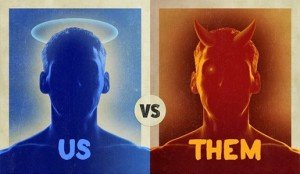
Music and increased generosity
Hello Dear Reader,
Happy New Year! I hope that 2015 brings you happiness, prosperity and good health.

I am starting the year with rather bad health. After a hectic end of the year at Sheffield University, a busy trip to Vietnam, and a full Christmas playing hostess to my family, my poor tired body gave in to a bad cold.
Luckily I am in Spain with my future in-laws. This means I can get plenty of rest away from ‘normal life’ and my mother in law to-be spends her time spoiling me to try and fix me as quickly as possible.
Such kindness and selfless behaviour is one of the things we should treasure most in this world. ‘Altruism’ is a term coined by the French philosopher Auguste Comte to means the practice of being concerned over the welfare of others.
The term was derived from the Italian word altrui, which in turn was derived from Latin alteri, meaning “other people” or “somebody else”. Altruism means unselfish devotion to another, the opposite of egotism.
Altruism in families, such as that of my mother in law, is the most common case we tend to see in the modern world. However, altruism towards strangers is often cited as one of the biggest triggers of happiness and wellbeing in ourselves. See this report by the Mental Health Foundation for more information.
There are numerous influences on altruism, and many of these are situational. Studies show that people are less likely to be altruistic in their behaviours if they are hungry, cold, in pain or feeling rejected. A new study looks instead at a positive trigger for altruism – our very favourite music.
 In many previous blogs I have written about how our favourite music can induce chills, a rare, heightened emotional response to music characterised by shivers down the spine, hair being raised and goose pimples. Brain studies have uncovered the neurological pathways behind this response, and its all-important link to the mind’s reward system. This series of pathways lies deep in the brain; connecting our emotion centres to neurochemical fast lanes that stimulate and receive feel good messages.
In many previous blogs I have written about how our favourite music can induce chills, a rare, heightened emotional response to music characterised by shivers down the spine, hair being raised and goose pimples. Brain studies have uncovered the neurological pathways behind this response, and its all-important link to the mind’s reward system. This series of pathways lies deep in the brain; connecting our emotion centres to neurochemical fast lanes that stimulate and receive feel good messages.
So yes – our very favourite music that gives us chills makes us feel great. But does this have a secondary effect on how we respond to others? Previous studies have found that music is associated with prosocial behaviours such as volunteering and tipping (see my book for more examples) but can this effect withstand the DICTATOR GAME?
A new paper by Hajime Fukui and Kumiko Toyoshima claims that chill-inducing music enhances altruism in humans. And here is why…
Method

The Dictator Game (DG) is used in economics to test the existence of altruism. Two groups of strangers are created, one called the ‘in -group’ (Dictators) and one called the ‘out-group’ (Recipients).
The groups are given logo identifiers to strengthen their sense of group identity and in the present test they even wore group t-shirts.
Dictators then see outlines of female and male figures on a computer screen that are labelled as being a Dictator (member of the in-group) or a Recipient (member of the out-group; counterbalanced). Each person was 10,000 yen (about £55 or $85) and told to allocate it to themselves as the Dictator and/or the out-group member in whatever quantities they liked.
Each participant allocated money to 4 people (male and female Dictator or Recipients) during silence or while listening to two different kinds of background music.
The music heard before doing this task was the critical variable. Before taking part in the DG test participants had already chosen a list of their very favourite music that gave them chills or disliked music. About half the favoured music was Japanese pop whereas the rest was classical or piano music. Disliked music included contemporary music, Enka (sentimental ballads), and computer game music.
In total 22 participants took part in the experiment (11 male and 11 female). The active part of the test, where background music was or was not present, lasted around 5 minutes.
Results
The authors established that their musical manipulation did indeed impact on emotions in the expected way (either positive or negative compared to silence), using post-test questionnaires.
Male dictators tended to give more than female dictators, in a twist that I did not expect (I did not expect any gender bias). However, this is apparently not unusual in the literature…
Unsurprisingly everyone gave more money to their ‘in-group’ than their ‘out-group’, mostly around 30% more.
Finally, the important finding, people tended to give more money while listening to their favourite music, and least when listening to music they did not like. This effect held for both in-group and out-group giving.
Conclusions
This core of this classical economics paradigm shows that, irrespective of group membership, people gave more money when they were in the presence of their favourite music. Conversely, they gave significantly less when they had to listen to music that they did not enjoy.
The conclusion is that enjoyable music promoted altruistic behaviour; favourite music was associated with people giving money to others when they had the option to retain the money for themselves.
The downside to this, of course, is that music can also promote selfish, hoarding behaviours as well, when the person dislikes the music they hear.
The authors suggest that the key to understanding this effect is emotional responses to music. They write about how musical emotions may be linked to empathetic responses, because we feel a tie to human beings who write/ perform music we like and hostility to those who produce music that annoys us. The authors also talk about how positive music activates the amgydala, a region associated with developing and expressing interpersonal trust.
These and other neurological arguments in the paper did not convince me, since there is no supportive evidence in the paper. But the behavioural outcome was reasonable powerful and consistent – in the presence of their favourite music the participants in this study were more generous in the amount of real money they allocated to others over themselves.
This study adds another small piece of evidence to the larger data that show how music can influence decision-making and social behaviour, and once again points to a shift in emotional state as being at the core of that effect.
Finale
So Dear Reader, that is a nice little paper for you to enjoy in the New Year; to digest, consider, debate and evaluate. While you do that I am going to curl up with a nice lemon and ginger tea and work on exorcising this uninvited viral invader from my corporeal being.
Why not try doing one random act of kindness tomorrow? You might find it does you a lot of good 🙂 (https://www.randomactsofkindness.org/)




6 Comments
MARC
Hi Vicky !
It’s really impressing. After reading your book, every step into new research is absolutely awe-inspiring. Music is always surprising us !
Incredible !
Thanks for the news and your wonderful renewed web.
Marc
Once Upon a Sound
You are imprissing us Dr. ! Keep it up
Pingback:
Pingback:
Pingback:
Pingback: